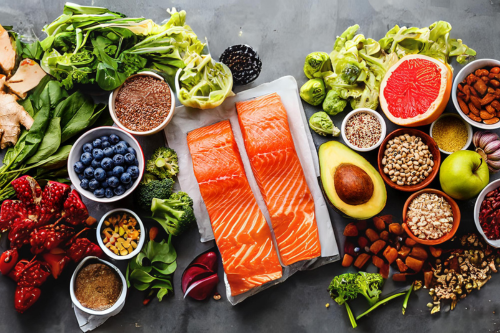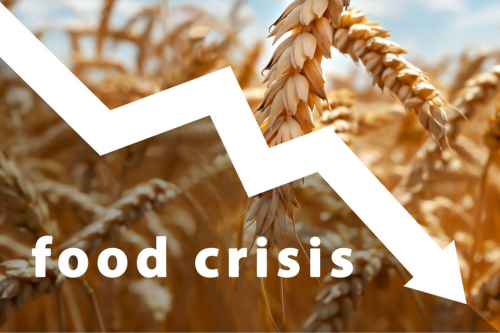Introduction
In today’s fast-paced world, maintaining good health and well-being is a top priority for many individuals. One of the most crucial factors in achieving and sustaining good health is our diet. The food we consume plays a pivotal role in our overall well-being, affecting everything from our energy levels to our immunity. In this article, we will explore the importance of healthy food choices and provide insights into how they can contribute to good health and well-being.
Leafy Greens
Spinach, kale, and Swiss chard are nutritional gems. Packed with vitamins, minerals, and antioxidants, these leafy greens offer a powerhouse of benefits. Their low-calorie, high-fiber profile makes them excellent choices for not only managing your weight but also providing essential nutrients.

These greens are a nutritional powerhouse, brimming with fiber, vitamins, and minerals. They bolster your immune system, promote healthy skin, and reduce the risk of chronic diseases. Their low-calorie content makes them a smart addition to your diet if you want to maintain a healthy weight. Adding spinach, kale, or arugula to your meals can be a simple yet effective way to elevate your overall health.
Whole Eggs
Eggs were once considered unhealthy due to their high cholesterol and fat content in the yolks. Recent studies, however, have refuted this myth, demonstrating that egg consumption has no substantial impact on blood cholesterol in the majority of people.

Eggs are also a nutritional powerhouse, loaded with important vitamins and minerals. They’re especially high in choline, a vitamin that’s essential for brain and nerve health. Only one egg (50 grams) contains 27% of the recommended daily amount of choline.
Eggs are a great ally in the fight against obesity. Their high protein level makes you feel full between meals, which reduces your intake of extra calories.
Whether you like the yolks or not, eggs are a nutritious supplement to your diet.
Fatty fish
Fatty fish, such as salmon, mackerel, and sardines, are nutritional powerhouses due to their high quantities of vital fatty acids. These fatty acids, especially omega-3s, provide several health advantages. They are well-known for their heart-protective effects, as they reduce inflammation, improve blood vessel function, and lower triglyceride levels.
For additional info: Tips to Improve Your Health
Fatty fish promotes brain function and growth, making it a good choice for cognitive well-being in addition to heart health. Omega-3 fatty acids found in these fish are essential components of brain cell membranes and have been linked to improved memory and cognitive function.

Additionally, fatty fish is a great source of high-quality protein as well as necessary vitamins and minerals including selenium, vitamin D, and vitamin B12. These nutrients support immunity, overall health, and the upkeep of healthy bones and teeth.
Fatty fish is an essential part of a balanced and health-conscious eating regimen because it may be a delectable and nourishing method to boost your well-being.
Yogurt
Yogurt is a nutritious dairy product packed with health benefits. It’s a rich source of protein, calcium, and probiotics, which are beneficial bacteria that support gut health and digestion. The probiotics in yogurt can help with conditions like irritable bowel syndrome and lactose intolerance.
Yogurt is also high in vitamins like B12 and riboflavin, which are essential for energy production and overall health. Additionally, the calcium in yogurt contributes to strong bones and teeth.

Greek yogurt, in particular, is protein-rich and lower in carbohydrates, making it a popular choice for those watching their sugar intake.
Whether enjoyed on its own, in smoothies, or as a topping, yogurt is a versatile and wholesome addition to a balanced diet.
Dark chocolate
Dark chocolate, with its intense cocoa flavor, offers more than just a delightful treat. Due to its high cocoa content and lower sugar content as compared to milk chocolate, it has a number of possible health advantages.

Dark chocolate contains antioxidants such as flavonoids, which can help protect cells from free radical damage. These antioxidants may help enhance heart health by lowering blood pressure and increasing blood flow.
Dark chocolate consumption in moderation has been related to better mood and cognitive performance due to the presence of chemicals such as theobromine and phenylethylamine.
It’s important to opt for dark chocolate with at least 70% cocoa content to maximize these benefits while minimizing sugar intake. Dark chocolate can be a delectable and possibly healthy treat when consumed in moderation.
Avocados
Avocados are a fruit rich in nutrients that are praised for their many health advantages. They include a lot of good monounsaturated fats, especially oleic acid, which is good for the heart. By lowering harmful cholesterol levels and heart disease risk, increasing these fats can aid.

Additionally, avocados are a powerhouse of fiber, nutrients, and vitamins. They offer vital minerals including potassium, which helps regulate blood pressure, and folate, which is important for cell division and general health.
Avocados are also known for their ability to aid with weight management and satiety due to their fiber and healthy fats. They can also help with eye health since they contain lutein and zeaxanthin, both of which are necessary for clear eyesight.
Including avocados in your diet can be a delicious and nutritious approach to improve your overall health.
Whole grains
Whole grains are rich in fiber, vitamins, and minerals. They promote digestive health, help with weight management, and regulate blood sugar levels. They’re also associated with reduced heart disease risk, thanks to their ability to lower cholesterol and blood pressure. Including whole grains like brown rice and quinoa in your diet enhances overall well-being.

Legumes
A class of nutrient-rich, plant-based meals known as legumes provides a range of health advantages. Beans, lentils, chickpeas, and peas are included in this group.

As a fantastic source of plant-based protein, legumes are a fantastic option for vegetarians and vegans. Additionally, they include a lot of dietary fiber, which promotes digestive health and aids with blood sugar regulation.
Furthermore, beans are a great source of vitamins and minerals like folate, iron, and potassium, all of which are crucial for a number of body processes. Because of their low glycemic index, they are an excellent choice for diabetes management.
Legumes can help reduce the risk of chronic diseases, boost heart health, and contribute to a well-balanced diet. They have a flexible and sustainable food supply, which makes them a great supplement to a diet that emphasizes health.
Nuts and seeds
Nuts and seeds are little nutritious powerhouses bursting with a variety of health advantages. They are abundant in heart-healthy monounsaturated and polyunsaturated fats, which can aid in lowering harmful cholesterol levels and lowering the risk of heart disease.
Nuts and seeds are particularly high in plant-based protein, making them a perfect supplement to a vegetarian or vegan diet. Their fiber content promotes digestive health and makes you feel full, which aids in weight loss.

Additionally, nuts and seeds are a great source of important vitamins and minerals like vitamin E, magnesium, and zinc. These nutrients are essential for sustaining immune system strength, bone density, and general health.
Including a variety of nuts and seeds in your diet can be a tasty and nutritious approach to improve your health. Just be aware of portion amounts because they are high in calories.
Cruciferous vegetables
Cruciferous vegetables, including Brussels sprouts, broccoli, cauliflower, kale, and other varieties, are nutrient-dense foods that provide a host of health advantages. They are well-known for their unique chemicals, including glucosinolates, which have been related to cancer prevention and inflammation reduction.

Cruciferous vegetables are high in vitamins, particularly vitamin C, and are high in fiber. Due to its ability to make you feel full, this fiber supports digestive health and aids in weight control.
These vegetables also contain essential minerals like potassium and folate, which contribute to overall health and well-being. Additionally, they are packed with antioxidants, which can help protect cells from oxidative damage.
Incorporating cruciferous veggies into your diet can be a delicious and healthy strategy to improve your health and lower your risk of chronic diseases.
Conclusion
Maintaining good health and overall well-being requires making intentional and diversified eating choices. The meals mentioned, from leafy greens to fatty fish, support a variety of bodily functions, including heart health, brain function, weight management, and more. By including these nutrient-dense foods in our diets, we may significantly improve our long-term health and guarantee a higher standard of living.
For more Amazing and Unique information and Posts Visit our Home page... If you have any suggestions or information feel free to share with us ….







